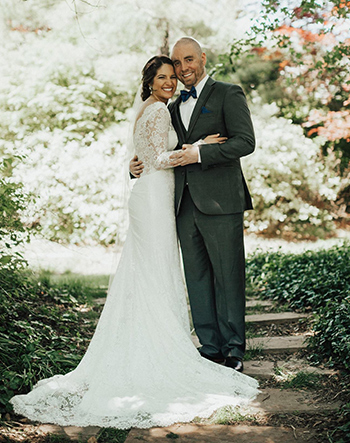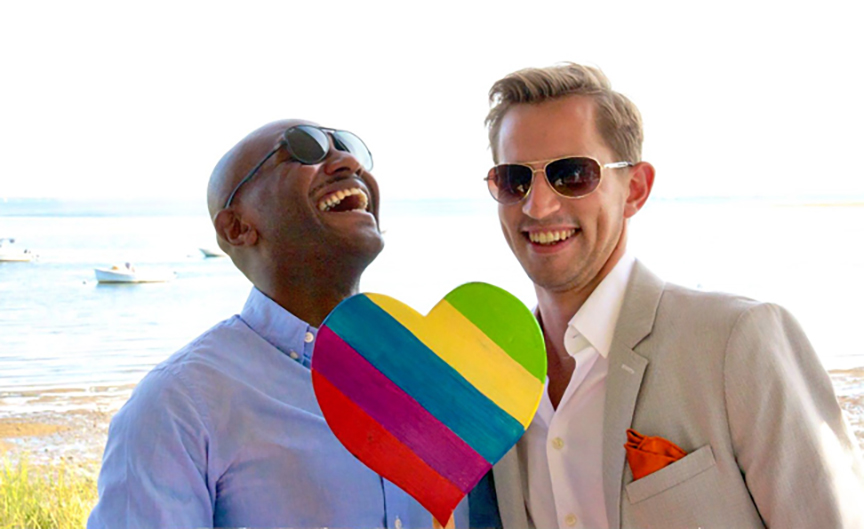As Jacque Mool and Sean Murray sat next to each other during orientation at Southern Illinois University School of Medicine in 2013, the school’s dean made a prediction: “By the time you graduate, your class will include eight couples.”

The two contributed to fulfilling that forecast fast. Within a month, Jacque had taken Sean home to meet her family, and Sean had basically moved into her apartment. They married right before graduation, and even hope to practice medicine together someday. “I just love that I can come home and talk about everything — about cases, attendings, frustrations,” says Jacque. “I don’t have to explain anything.”
Many medical couples feel the same kind of connection. In fact, nearly 40% of doctors have married other doctors or health care professionals, according to the American Medical Association. And while relationships involving a power differential, such as an attending dating an intern, can raise concerns and often are addressed by institutions’ guidelines, dating among medical students is so accepted that the National Resident Matching Program® created Couples in the Match® back in 1987. And if that is any indication, medical pairings are thriving: In 2018, the program drew 1,165 couples, up from 738 a decade ago.
Relationships during medical school or residency offer the loving ear and warm shoulder of a partner who understands the ups and downs of medicine. But they also can double the challenge of too little free time and punishing schedules. What’s more, romance sometimes goes sideways, possibly making for years of awkward interactions.
“Becoming a physician is a hard and beautiful journey. Finding someone to share it with means that no matter what you’re doing — anatomy lab, rotations, whatever — the other person knows what you’re going through and can support you along the way.”
Benjamin Chan, MD, University of Utah School of Medicine
The magic of medical love stories
Many medical relationships are built on shared values, similar passions, and deep commitments to medicine. “Becoming a physician is a hard and beautiful journey,” says Chan. “Finding someone to share it with means that no matter what you’re doing — anatomy lab, rotations, whatever — the other person knows what you’re going through and can support you along the way.”
In fact, couples say that acting as one another’s sounding board — whether helping with a tough case or listening to complaints about difficult personalities — is tremendously satisfying. “The most successful doctors — really, the most successful people — are good at forgetting about themselves and making themselves into a servant of others,” says Charlie Stevens, MD. “It works in all relationships. The more you can do that, the better it is for you and your partner,” notes Stevens, who met his wife Danielle Rush Stevens, MD, at Oakland University William Beaumont School of Medicine.

There also are practical benefits to med school romances, like gaining a built-in study partner. “When we got tired of studying, we encouraged each other to keep going,” says Ariane Lemieux of how she worked with her fiancé Jeff Traylor, whom she met at the University of Texas at Austin Dell Medical School. “We quizzed each other constantly: while studying, in long lines at events — even occasionally on dates when a question popped up in our heads,” she adds. “We are able to push and support each other in a unique way.”
Managing the downsides
Dating a colleague or classmate also brings risks and challenges. If the relationship flames out, years of tension may lie ahead. “That can force fellow students or residents to have to pick sides. And it can make it uncomfortable for teachers and anyone who works with them, too,” says Chan.
Many couples manage that risk by keeping their relationship private. “Deciding when to go public was the trickiest part,” says Rush Stevens. “By the time we started dating, there were already couples in our class that were falling apart. So we didn’t tell many people for a few months.”
“Deciding when to go public was the trickiest part. By the time we started dating, there were already couples in our class that were falling apart. So we didn’t tell many people for a few months.”
Danielle Rush Stevens, MD, University of Texas Health Science Center
In addition, couples may fear how others will perceive them once they go public. “I worried that I might not be taken as seriously,” says Elise Campbell, MD, a resident at Johns Hopkins Medicine who met her husband, Brad Bennett, MD, at Sidney Kimmel Medical College at Thomas Jefferson University. “I had to tell him not to smooch or hug me in the hospital,” she adds. “[A]s a woman, I think I spend a lot more time worrying about how people perceive me.”
Perceptions are skewed against female doctors, says Sarah Epstein, a marriage and family therapist and author of Love in the Time of Medical School. For example, she points to persistent expectations that if a couple faces career sacrifices, the woman will take the hit. And partners also may need to handle feelings of competition between them. “If you are insecure in your performance, it will be hard,” says Jacque Murray. “Sean and I can offer constructive criticism to each other, but if one of us was doing worse, that might have been hard to hear."
Calendars and love notes
The biggest challenge for medical couples usually is making time for one another. Epstein says successful couples become scheduling ninjas, even if together time comes in half-hour increments. They also take other important steps, she notes, such as sending a sweet text during long shifts, leaving notes on pillows when working opposite schedules, and scheduling regular check-ins when one partner is away for training.
“Medicine dictates the cadence of your life,” notes Epstein. “But if you get in the habit of always saying, `This is what medicine demands,’ down the road you’ll likely be wondering why you didn’t do more to shape your own reality.”
“[I]f you get in the habit of always saying, ‘This is what medicine demands,’ down the road you’ll likely be wondering why you didn’t do more to shape your own reality.”
Sarah Epstein, Author of Love in the Time of Medical School
If finding the time to see a movie is daunting, planning a wedding can feel impossible. Korie Zink, MD, MS, and Rohan Gopinath, MD, fell in love at the University of Michigan Medical School and got engaged during their first year of residency.
"We had such a small window — just three days — when we could look at venues together,” she says. “We found a place we loved, and one of the few openings it had was in November. We took it, knowing that doing anything during our second year would be very stressful.”
The matchmaker math
For serious couples, deciding about Couples in the Match® presents a whole other set of decisions and logistics. When entering the Match® together, a couple creates a list with paired selections, and the Match® algorithm keeps moving down that list until they both match.

Crafting a paired list can require some difficult conversations, including whether to make choices based on the stronger candidate's options. "We structured our rank list entirely to be together, giving that higher priority over prestige,” says Bennett. “No matter what happened, we were going to be in the same location, and that was the bottom line.”
“I never wanted to see him sacrifice some dream. … I didn’t want to make him choose me over a career decision that felt right.”
Christopher Berger, MD, University of California, San Francisco
But Gaetan Pettigrew, MD, and Christopher Berger, MD, who fell in love during their final year at the University of Pittsburgh School of Medicine, decided against the couples option. “It was complicated,” recalls Berger. “I was just coming out [as gay], and we had long, serious conversations. How much weight do you put in a three-month-long relationship?”
“[W]e never wanted the resentments that might come if we felt we got in each other’s way,” explains Pettigrew. The two relied on plenty of phone calls and visits while Berger was doing his internship at University of California, San Francisco, Medical Center (UCSF) and Pettigrew was at University Hospitals in Cleveland, Ohio.
“I never wanted to see him sacrifice some dream. … I didn’t want to make him choose me over a career decision that felt right.”
Christopher Berger, MD, University of California, San Francisco
Despite the difficulties, they’re glad they matched separately. “I never wanted to see him sacrifice some dream,” notes Berger. “Marriage has a lot of compromises,” he adds, “but early on, I didn’t want to make him choose me over a career decision that felt right.’” And their story has a happy ending: Both are now at UCSF, Pettigrew as an OB-GYN, Berger as a pulmonary and critical care fellow, and the two have been married since 2015.
Note: Trademarks are the property of the respective trademark owners.
